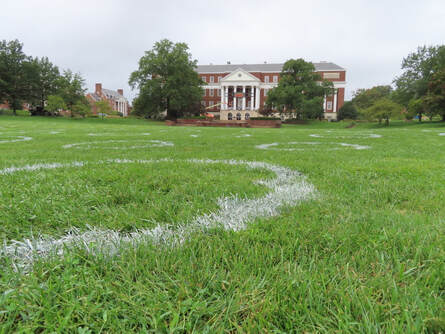Political polarization on campus: worse than ever before?
By Jackie DiBartolomeo
November 18, 2020
Image Credit: Jackie DiBartolomeo for The Campus Trainer
With the contested results of the U.S. presidential election still in the headlines, it seems that political polarization between Democrats and Republicans has continued to grow. A 2019 poll by Gallup concluded that Democrat and Republican approval ratings of President Donald Trump were the farthest apart for a president ever recorded in American history. Many believe the gap between Americans of different political beliefs has grown even wider since then. But have college students noticed this polarization on campus?
Dr. Sarah Croco, an associate professor in the Department of Government and Politics, thinks political polarization has gotten worse on campuses and in the country.
According to Croco, party sorting, a phenomenon where citizens define themselves by their political party, is the reason for the growing divide.
“Because you start to define your own self-worth based on your party identification, you get really hostile if someone attacks it,” Croco said.
Jacqueline Van Houten, a sophomore with an undecided major, has seen tension and heated conversation with her friends over politics, but has never broken up a friendship or relationship because of political differences, she said.
Van Houten believes that polarization has only gotten worse in 2020.
“Especially with the election, it’s bad. I didn’t feel like it was this bad last year. But because of the polarizing times, it now is,” Van Houten said.
Political polarization on campus is made worse by bias from the professors, Van Houten said.
“I took a government class first semester of my freshman year and it was a 50-minute lecture, and at least ten minutes of it was my professor ranting about how she didn’t like Donald Trump. So I do think that UMD does cater to one side,” Van Houten said.
Croco believes that every professor at UMD goes out of their way not to influence students on their political beliefs.
“People think that we can command students attention and change their minds, but we can’t get them to read the syllabus,” Croco said.
Hunter Petit, a junior information systems major, thinks a bias is to be expected on campus.
“We’re in a college environment, and college campuses are overall very liberal. I think they do sometimes favor the more liberal perspective, but that’s what I expect given it’s a liberal college campus,” Petit said.
Though there are bound to be different political beliefs between friends in college, political divides should not prevent people from having a friendship or relationship, Petit said.
“The vast majority of my closest friends are all Democrats, some are more moderate while others are socialists, and I think having a balance in your friend group is a great thing,” Petit said.
For citizens to become less polarized, common ground is needed, which can be difficult to find, Croco said.
Organizations, such as Braver Angels, have been created to bridge the political divide, sponsoring retreats for people of different views to come together and find this common ground. This shows how far political polarization has gone, Croco said.
Petit believes that political polarization in the United States is the worst that it has been for as long as he can remember, and that a serious change is needed on college campuses.
“Being able to talk to people regardless of their views, and understanding who they are for who they are instead of the different labels we give each other, I think is something that is really great for the country, and I think we need more of it,” Petit said.
|
|
Learn more |
© COPYRIGHT 2020. ALL RIGHTS RESERVED.
|
